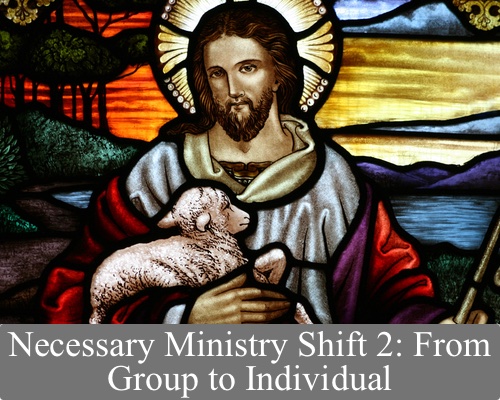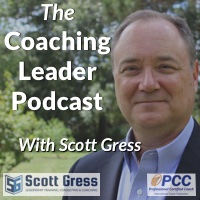
Wait. That just sounds nuts. Churches are all about group activities, especially on Sunday. Besides, God loves both! God is gracious to people one at a time and at the same time He loves the whole world. Pastors give attention to individuals all the time. There are hospital calls, shut in calls and the like. We pray for individuals and many work hard at caring for people one at a time. Then we come together for worship where we worship together as the body of Christ. This is most certainly true. Yet why when it comes to outreach and evangelism and even discipleship our mindset seems to immediately think “group”?
We think: how can we get them to come? What will get them here? We think herd mentality, more the merrier, the most “bang for our buck.” In other words, if we are going to do something (program, strategy, ministry effort, event or activity) that will move the ball forward in ministry with people, then let’s do it on a group scale rather than an individual scale. We rationalize that it just makes sense because we will touch more lives rather than less lives. It appeals to our sense of stewardship and economies of scale. Anything else would seem painfully slow.
(Okay, a secret, unconfessed or unconscious thought: It is easier to initiate and manage an event or program than have to deal with the nitty gritty of individuals and relationships with all their wants and needs and issues. Yes, even if that programing decision is a “small” group.)
Yet what happens when the “group thing” doesn’t work? What happens when new people or people in general don’t come to church or the church outing? What happens when that program or class designed for the group and for inviting newcomers doesn’t work? Maybe you are having trouble getting people to lead those things and/or maybe people just aren’t showing up either! It is not uncommon in churches that month after month, time after time, there are no new people. Then what? Are we supposed to twist people’s arms to be more inviting? It’s not going to work if 99% of their friendships consists of other church members. Then what? Are we supposed to attract new people out of thin air and hope they just show up? That doesn’t seem to work either. It can be discouraging.
Unfortunately this is where a lot of churches are at the moment. The mindset for outreach or evangelism or discipleship is unconsciously linked to the group approach. There was safety in numbers. The worship service or the outing to the ball game was a place where you would invite your unchurched friends. It was low pressure. It was also the thing where “fellowship” would happen. It used to work…sometimes. Church was a common place for socializing, for gathering. But not so much anymore. If we plan this kind of thing now, it may be rare that new people are invited. It then becomes kind of a church “club” thing more than we’d like to admit. So in the end it really isn’t about outreach or evangelism or even discipleship. Oops.
In the meantime we’ve almost forgotten how to do relationships. Ask churched people about their number of friends who are unchurched and they will say few if any. Ask someone in today’s churches how they would disciple someone else as a follower of Jesus and they would probably respond, “Bring them to church.” Okay, but really doesn’t life transformation involve something more? Of course it does.
With a ministry shift to an individual we bring our attention back to Jesus parable of the shepherd leaving the 99 to look for the one (Luke 15). It means missing the one who has wandered off as well as the one for whom Christ died who is not yet there! This requires first having the time and the heart for someone who may just be your acquaintance currently. It means even noticing them in the first place! It means being truly available for them, talking with them regularly. Caring about what they care about by listening deeply and not seeking to “win the argument.” Then it means loving them and praying with them and for them and then asking how God is answering those prayers. It means “rejoicing with those who rejoice and mourning with those who mourn” (Romans 12:15).
But that takes time and effort and emotional investment! Bingo. It’s far easier to invite them to church or to the church event or outing. But we never do because why would we make that jump to invite someone whose name we don’t even know or whose life story we haven’t been entrusted with? We won’t. It’s not going to happen. Thus the shift to attention and ministry to individuals.
Notice the lonely neighbor, the infrequent worshipper, the quiet office mate, the isolated worker where you always buy your gas or coffee or groceries. They are people for whom Christ died. Ministry shift: die to self and invest yourself in a relationship with someone one at a time. It only takes a spark. It will make an eternal difference for that one.
So “what does this mean?” What this means is that our church programming and ministry will also need to shift to activities and acts of service where the church seeks to make friends, build relationships and come along side individuals for the long term. It is an investment. It is often wearisome work that hurts your heart as you hurt for people and love them unconditionally. But it will not be the self serving “fellowship” activities of the past. Yet, as you serve others alongside your brothers and sisters in Christ you will bond with them like never before.
Sign up for our email newsletter with new blog posts and information and announcements:
Scott Gress is called by Lutheran Counseling Services and partners with the FL-GA District of the Lutheran Church as an independent contractor. He specializes in Leadership Training, Consulting, Coaching and Coach Training. Check out his YouTube channel for more leadership and coaching information. Contact Scott to continue the conversation or experience a free sample coaching session. 561-542-4472, scottgress@me.com or scottgress.com
"Coaching leaders of leaders"
Check out the new: Coaching Leader Podcast!

